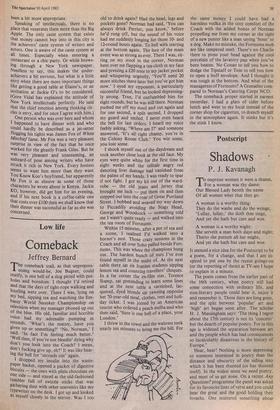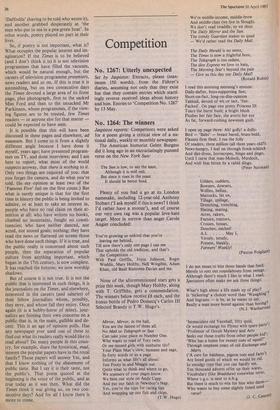Postscript
Shadows
P. J. Kavanagh
onpreise women it were a shame, For a woman was thy dame: Our Blessed Lady bereth the name Of all women wher that they go.
A woman is a worthy thing: They do the washe and do the wringe, 'LWlay, lullay,' she doth thee singe, And yet she hath but care and woe.
A woman is a worthy wight: She serveth a man both daye and night; Therto she putteth all her might, And yet she hath but care and woe.
It seemed a nice idea for the Postscript to be a poem, for a change, and that I am in- spired to put one by the recent goings-on (or the reporting of them) at TV-am I hope to explain in a minute.
The poem comes from the earlier part of the 16th century, when poetry still had some connection with ordinary life, and non-literary people could hear it, enjoy it and remember it. Those days are long gone, and the split between 'popular' art and `high' art began soon after. The scholar H. J. Massingham says: 'The thing I regret about the 17th century is not its 'conceits' but the dearth of popular poetry. For in this age is widened the separation between art and the people which has had consequences so incalculably disastrous in the history of Europe.'
Hear, hear! Nothing is more depressing to someone interested in poetry than the distance and obscurity of the siding into which it has been shunted (or has shunted itself). In the widest sense we need poetry, and most of us get none. On a recent Any Questions? programme the panel was asked for its favourite lines of verse and you could hear the great and the good holding their breaths. One muttered something about
'Daffodils' (having to be told who wrote it), and another grabbed desperately at 'the men who put to sea in a pea-green boat'. In other words, poetry played no part in their lives.
So, if poetry is not important, what is? What occupies the popular interest and im-
agination? If the Times is to be believed
(and I don't think it is) it is not television programmes that have filled the vacuum, which would be natural enough, but the
careers of television programme presenters, news readers and so on. If this is true it is
astonishing, but on two consecutive days
the Times devoted a large area of its front page, plus photograph, first to the sacked Miss Ford and then to the unsacked Mr Parkinson, whose programmes, if the view- ing figures are to be trusted, few Times readers — or anyone else for that matter could be expected to have seen.
It is possible that this will have been discussed in these pages and elsewhere, ad nauseum. But I come to it from a slightly
different angle because I have done it myself, years ago; have presented program- mes on TV, and done interviews; and I am
here to report, what most of the world suspects anyway, that there is nothing to it.
Only two things are required of you: that you forget the camera, and do what you're told. (In my opinion at least two of the `Famous Five' fail on the first count.) But what is surely unique is that for the first time in history the public is being invited to admire, or at least to take an interest in, people who have no real claim on their at- tention at all: who have written no books, climbed no mountains, fought no consti- tuencies; who have neither danced, nor acted, nor scored goals; nothing; they have read the news or flattered on screen those who have done such things. If it is true, and the public really is concerned about such people, then the separation of popular culture from anything important, which began in the 17th century, is now complete. It has reached the bottom; we now worship shadows.
But of course it is not true. It is not the public that is interested in such things, it is the journalists on the Times, and elsewhere, interested in the careers (and salaries) of their fellow journalists whom, possibly, they envy, and whose fall they enjoy. Once again (it is a hobby-horse of mine), jour- nalists are foisting their own concerns On a public that is, in the main, gullible and de- cent. This is an age of opinion polls. Has any newspaper ever used one of these to find out what its readers really would like to read about? Do many people in this coun- try, for example, share the hysterical, mad, interest the popular papers have in the royal family? Those papers will answer Yes, and that I know nothing of the abasement of public taste. But I say it is their taste, not the public's. That poem quoted at the beginning is the voice of the public, and as true today as it was then. What did the Times think it was giving us, on two con- secutive days? And for all I know there is more to come.











































 Previous page
Previous page